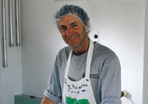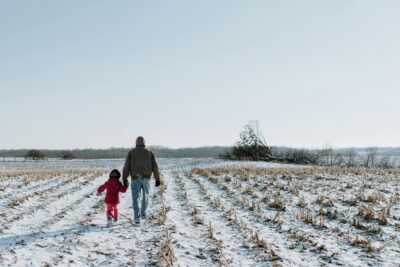
There were many highlights at the 2002 Farm Aid concert in Burgettstown, Pennsylvania: beautiful weather, a rambunctious crowd, and an even more rambunctious Kid Rock. But for the Farm Aid staff one of the most exciting things about the Pennsylvania show was getting to know the staff and farmers of the Pennsylvania Association of Sustainable Agriculture (PASA). PASA has been among our funded groups ever since.
PASA’s mission includes strengthening existing family farms, getting more farmers on the land, and increasing the harmony between agriculture and the natural environment while providing and promoting healthful, local foods to the consumers of Pennsylvania. Newsletters, educational programs, an ever expanding annual conference, and consumer outreach campaigns are some of the ways that this organization makes sure that everyone in the state knows what they are up to.
PASA members and farmers interpret the notions of sustainability with passion and commitment but the rules aren’t rigid. During the annual conference you can meet all kinds of farmers from certified organic, to raw milk dairy producers, rotational grazers, and free-range poultry experts. At a bottom line, PASA is about farmers learning from each other about how to make their operations more sustainable, both economically and environmentally, and consumers enjoying the delicious results. Sound too simple? Check out this sample piece of the PASA pie:
Brian Futhey of Stone Meadow Farm in Woodward, Pennsylvania was raised a conventional dairyman. In the 1990s, Futhey was having a tough time making ends meet. He explains, “It was a real squeeze. Milk prices were low, there was a drought and it was very dry. We had to keep purchasing feed and I was still renting from my father.”
Convinced that there had to be a better way, this entrepreneur started reading about dairying in New Zealand where cows graze on grass and are milked seasonally along with their natural reproductive cycle. “I wasn’t a machinery person to start with,” says Brian. “So if there was a way for the cows to consume their own forage instead of dealing with equipment and it was more profitable it seemed to make a lot of sense.”
Reading all he could on the topic, Brian also started going on farm walks with other farmers who were curious about alternative kinds of dairy farming. At the same time, a friend introduced him to the Pennsylvania Association for Sustainable Agriculture – a community that would prove to be instrumental in starting his new operation.
While grass based dairies are increasingly common these days and were certainly the norm one hundred years ago, when Brian was contemplating the switch many were skeptical. “My Dad was dead set against it. He said that cows would never graze on his farm.” Brian’s best option at the time was to start looking for another property where he could try out the new (old) techniques.
In 2003, with some help from a few family members, Brian started milking a small herd of Jersey cows his way. Because he started small and his production goals revolved around quality (as opposed to quantity), Brian could be choosy about the cows he worked with. “I have to enjoy being around my cows. Otherwise what is the point?”
Once production started, Futhey had to decide what to do with his milk. “I thought about selling directly. I have such a healthful product and I wanted to get it out to as many people as possible.” Selling liquid milk to stores, though, is complicated. The farmer must invest in bottling equipment, deliver product to the stores, and take it back if it doesn’t sell. The answer? Cheese!
Cheese, even from raw milk, can be shipped anywhere in the United States; the price per pound can be up to three times the value of liquid milk; and the processing equipment is slightly more affordable than the bottling plant. “A value added product just made more sense,” said Brian. “Besides, when you eat something from exceptional raw milk, you can just tell.” This product would sell itself.
But how does one start up a cheese business? Brian and his wife went to a cheesemaking workshop that is part of the PASA Farm Based Education Program, where farmers share lessons learned on their farm with other farmers, and sometimes consumers, who want to learn about making changes in their own operations. 2005 topics ranged from Ecological Weed Management to Pastured Pork to Intensive Cheesemaking.
PASA Program Coordinator, Heather House explains that participants of the Farm Based Education Program want to learn directly from farmers, get ideas and network with people who share their interests. Brian’s interest was certainly piqued at his PASA workshop. He describes his goals this way: “I wanted to make a type of cheese that I could enjoy making, that is good, and that is profitable.”
Armed with a vision of an on farm cheese business, Brian hired a consultant to teach him how to make a handful varieties that could be sold commercially. “Cheddar was my first cheese and I have never had a bad batch!” said Brian proudly. Three years later, Brian’s Stone Meadow Farm Cheeses includes the trusty Cheddar, Camembert, Colby and Baby Swiss and can be found at two farmers markets, three co-ops and natural foods stores as well as in the homes of friends and neighbors of Stone Meadow Farm.
Cheese is still a new business for the Futheys and Brian is honest about getting started, “The limiting factor is how much cheese I can make.” With retailers calling to inquire about his product, it is important to check in with the original vision every now and then. “I don’t want to get big.” says Brian. “One day it might be nice to have a few specialty cheeses that make it into the city but I am not looking at big [production] numbers. The main thing that sells the cheese is the taste.” And judging by the line of people waiting to sample the goods at Brian’s table at this years PASA conference cheese tasting, this is a success story.
Connect with Stone Meadow Farm on their Facebook page


